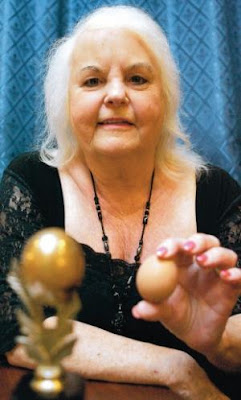 |
| Pace eggs, image courtesy of Wikipedia. |
The world "pace" comes from the old English word "pasch" for Easter. In the north of England people make pace eggs, boiling them with onion skins, sometimes tying colored wool yarn around them. These eggs are used in egg jarping, another word for egg tapping.
 |
| Competition eggs are numbered. Image courtesy of The Northern Echo. |
Pace eggs are distributed to players who hit each others' eggs with their own. The person with the last intact egg is the winner. There is a world championship held every year by the WEJA (World Egg Jarping Association) at the Peterlee Cricket Club in Peterlee, County Durham. Last year's winner had only jarped or dunshed for the second time, but had been practicing by boiling at least two dozen eggs a week to try different methods. There were only 16 competitors last year, but the event conflicted with another one, according to organizers. Contestants in past years have come from as far as South Africa.
 |
| 2009 World Champion, Ann Watson. Image courtesy of The Northern Echo. |
Competition rules state that the competition eggs must be boiled in the same container on Easter Sunday evening. They cannot be tampered with. In the past contestants have tried strengthening the eggs by dipping them in beer, painting with nail polish, rubbing in hair cream, or warming them. The players got a free egg supper, salt and pepper courtesy of the club. The entrance fee is usually £1. Proceeds from the event go to support cancer research.
 |
| Larry Mason and a female competitor at the 2009 contest. Image courtesy of The Northern Echo. |
According to Roy Simpson, WEJA chairman, "We just thought that everything at Easter was being aimed at the kids and it was time we did something for the grown-ups. It's a daft little tradition, it does no one any harm and it raises a few bob for charity."
Pace egg plays are also an old tradition from the Middle Ages. They were traditional village plays that once were performed all over England, but now are seen in a few areas, Lancashire and West Yorkshire particularly. These short (sometimes just ten minutes) plays are a contest of light against dark, spring against winter, usually with St. George smiting all challengers. In this rebirth scene, and hence its ties to Easter, the hero is killed and a doctor brings him back to life, often a quack doctor.
The words in the plays are probably 17th century, but the action has a longer history. Only men perform them, no females. The resurrection of the hero is thought to be the case of the winter and spring rising to fight another day. Or year.
 |
| A Pace Egg Play from 2006. Image courtesy of Wikipedia. |
Many areas ceased putting on the plays after WWI, when many men were killed. The Bury Pace Eggers (the name of the acting company) were revived in 1969. They perform in squares and pubs in town and sometimes in nearby villages over Easter weekend. In West Yorkshire the plays have been going on for hundreds of years and are part of the Good Friday tradition.
However you plan to observe the Easter season, know that your ancestors probably observed some sort of Vernal celebration even thousands of years ago. Life goes on, and life changes. Happy Spring!
No comments:
Post a Comment
NOTE: COMMENTS WITH LINKS WILL NOT BE POSTED!